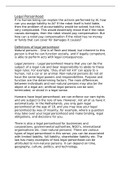Legal Personhood
If no human being can explain the actions performed by AI, how
can you assign liability to AI? If the robot itself is held liable,
then the problem of accountability would be solved, but this is
very complicated. This would essentially mean that if the robot
causes damages, then the robot should pay compensation. But
how can a robot pay compensation if the robot has no money
or funds that can cover for damages it causes?
Definitions of legal personhood
Natural persons – One is of flesh and blood, but inherent to this
person is that he can function socially, and if legally competent,
is able to perform acts with legal consequences.
Legal persons – Legal personhood means that you can be the
subject of a legal rule and bear responsibility to abide to these
legal rules. For example, ‘thou shall not kill’ can apply to a
human, not a car or an animal. Non-natural persons do not all
have the same legal powers and responsibilities. Purpose and
function are the determining factors. The main differences
between individuals and non-natural persons may also be the
object of a legal act; artificial legal persons can be sold,
terminated, or sliced in a legal sense.
Humans have legal personhood; we can enforce our own rights
and are subject to the rule of law. However, not all of us have it
automatically. In the Netherlands, you only gain legal
personhood at the age of 18, and you may lose your legal
personhood by way of insanity, for example, where a guardian
may take over your legal personhood and make binding, legal
obligations, and decisions for you.
There is also a legal personhood for businesses and
corporations, governmental authorities, NGO’s, international
organisations etc. (non-natural persons). There are various
types of legal personhood in this sense; you can be associated
with limited liability, full liability, shareholder liability etc. The
law has many examples of how legal personhood can be
attributed to non-natural persons. It can depend on time,
geography, culture, politics, and technology.





